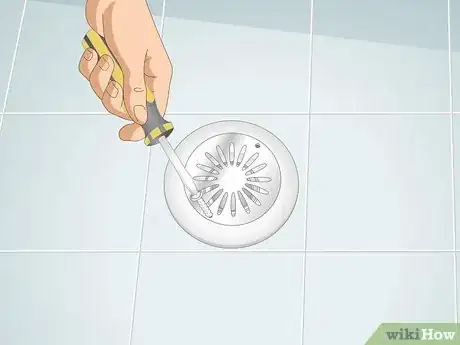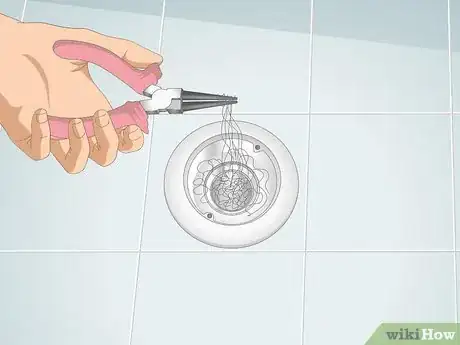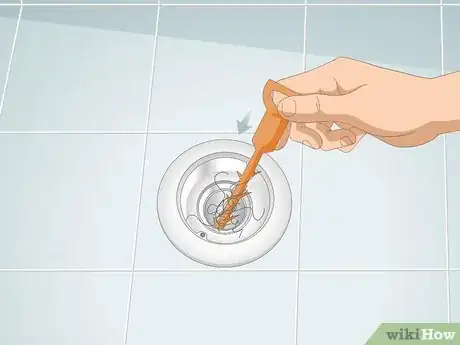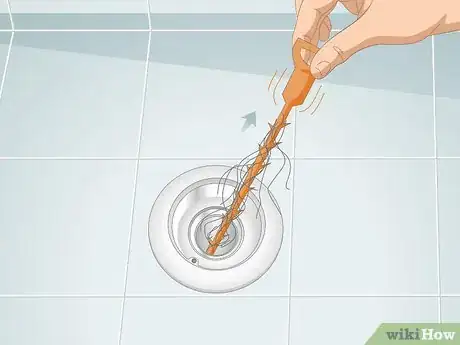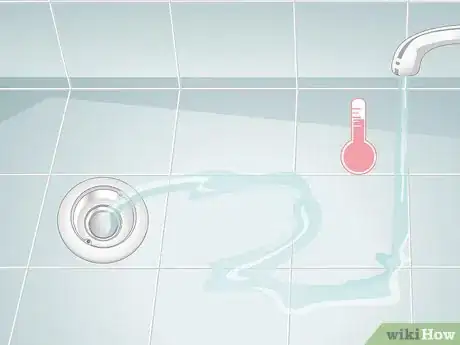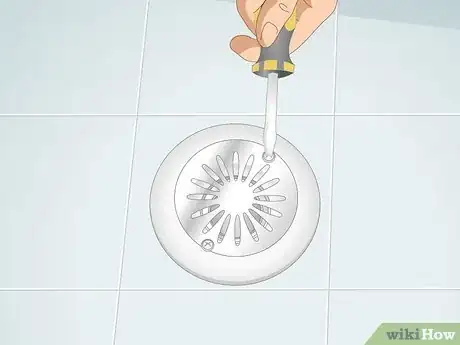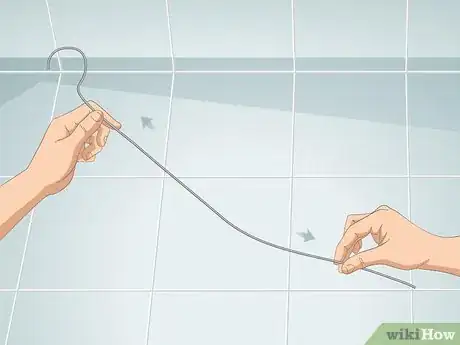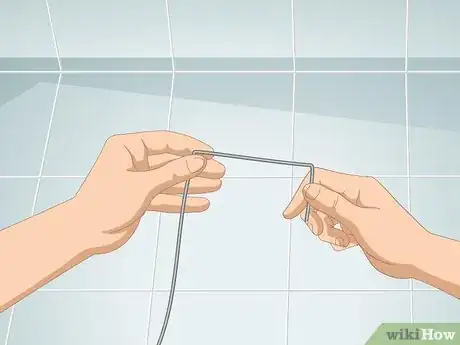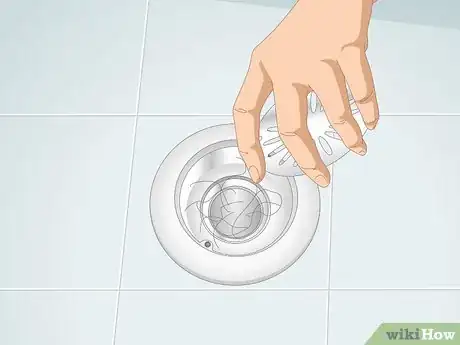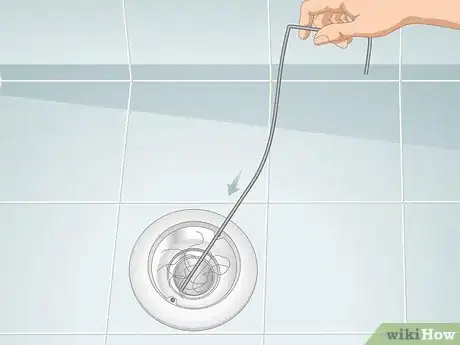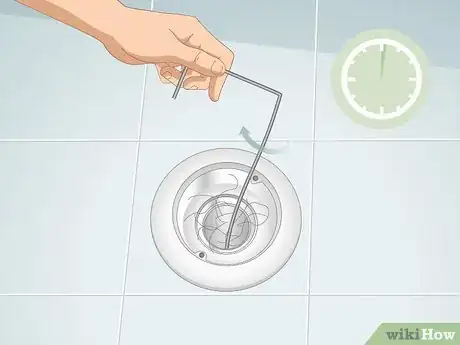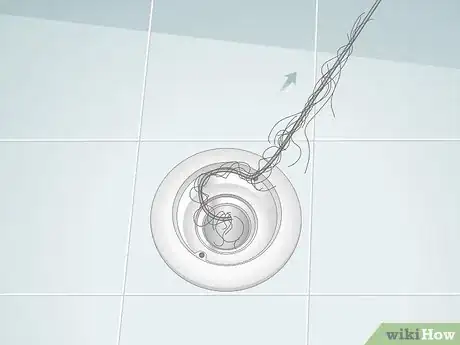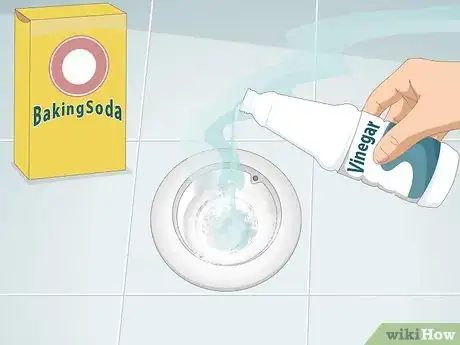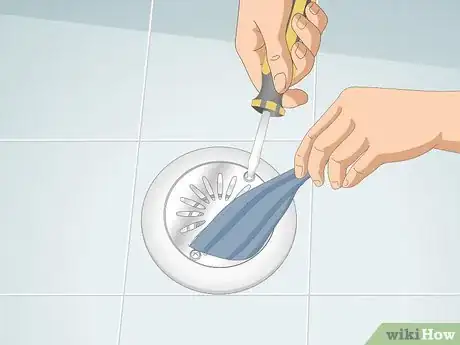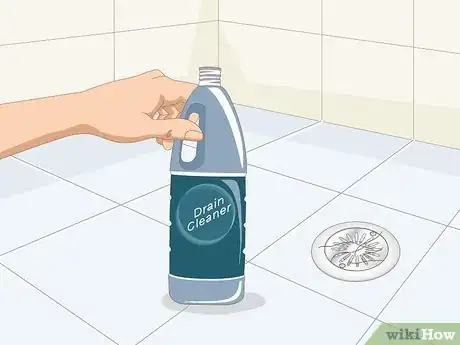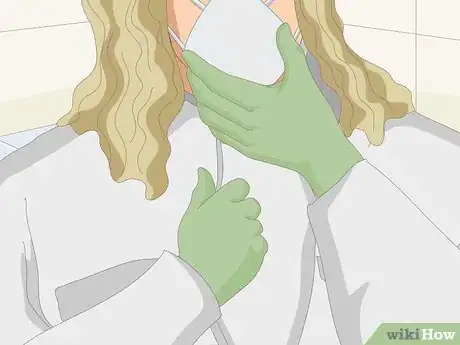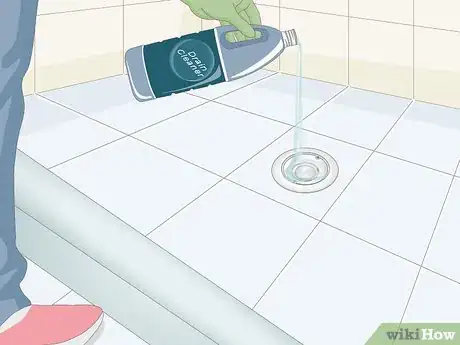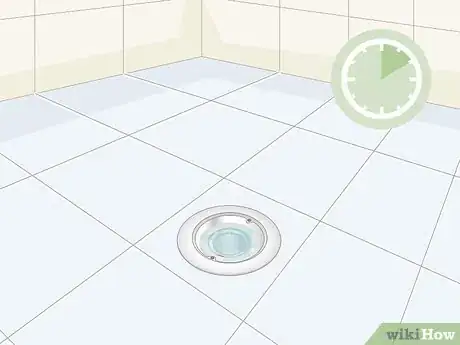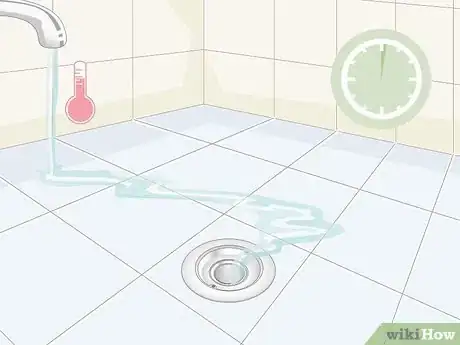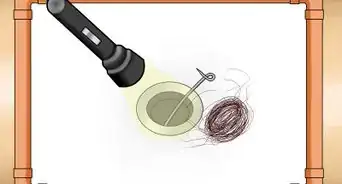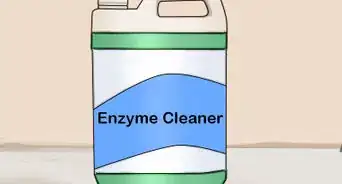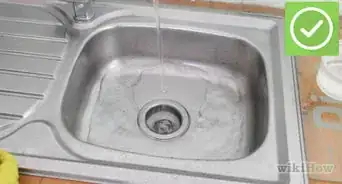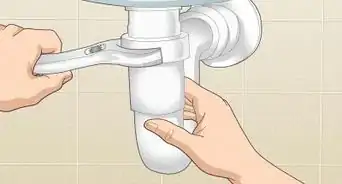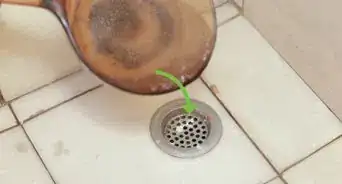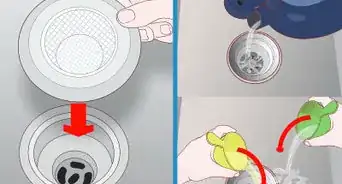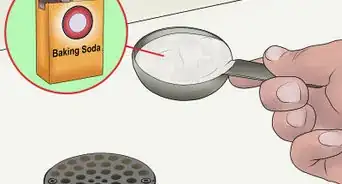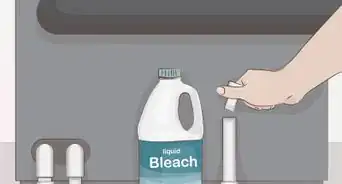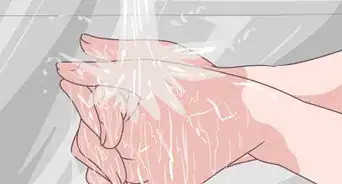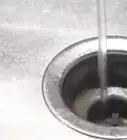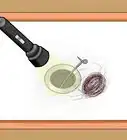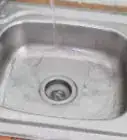This article was co-authored by James Schuelke. James Schuelke, along with his twin brother David, is the co-owner of the Twin Home Experts, a licensed plumbing, leak detection, and mold inspection company based in Los Angeles, California. James has over 32 years of home service and business plumbing experience and has expanded the Twin Home Experts to Phoenix, Arizona and the Pacific Northwest.
There are 15 references cited in this article, which can be found at the bottom of the page.
This article has been viewed 51,699 times.
Unclogging hair from the drain can be gross, but sometimes you have to do it! You can use a snaking tool specifically made for hair clogs or make your own using a wire hanger. Using chemical drain cleaners is also an option if you’d prefer to not mess with tools. If your drain is still clogged after you’ve removed all the hair you can, you may need to contact a plumber.
Steps
Using a Snaking Tool
-
1Use a screwdriver to remove the drain guard. If your shower drain has a guard, you’ll need to take it off to access the actual drain pipe. Insert the tip of a screwdriver into each of the screw heads and twist to the left to loosen them. Then, remove them and set them aside.[1]
- If the screws are smaller than the holes on the drain, place painter’s tape over the holes to prevent the screws from falling in.[2]
- If you have a tub and shower combination, you might be able to remove the drain guard by pressing the guard downward and twisting it to the left.
-
2Use pliers or tweezers to remove any visible hair towards the surface. If you see any obvious globs of hair gathered at the top of the drain pipe, use pliers or tweezers to dig it out. Discard the grimy hair into a plastic bag for an easy cleanup.[3]
- If possible, use an old pair of tweezers that you don’t use for other purposes.
Advertisement -
3Insert a plastic snake tool all the way into the drain pipe. Insert the end of a plastic drain snake into the pipe until the small handle is at the top of the drain opening. The snake tool looks like a long zip tie with small thorns and a handle on the end. Be careful handling it because the thorns are sharp![4]
- You can buy plastic unclogging tools online or at any home hardware store.
- If the tool resists going down, try rotating the angle at which you’re pushing the tool into the drain.
-
4Pull it out slowly, wiggling it as you pull upwards. Grasp the tool’s handle with your thumb, index, and middle fingers and slowly pull it out of the drain. In order to grasp the most hair, it may help to wiggle and twist it around as you pull it out.[5]
- If the tool gets stuck, wiggle it up, down, and side to side it until it comes out easily.
- This tool is only meant to be used once, so discard it in the trash after you pull it out.
-
5Rinse the drain with hot water. Turn on the hot water tap and rinse out the drain for about 10 seconds. You might see bits of grime and debris come out of the drain. If you see large globs of hair rise to the surface, pull those out with your hands and discard them.[6]
- If the drain is still clogged, you can try using a second snaking stick or, if the clog is stiff, call a plumber.
-
6Reinstall the drain stopper with a screwdriver or by twisting it into place. Use a screwdriver to twist each screw to the right, securing the drain guard in place. If you have a screwless stopper, simply insert it into the drain opening, push it all the way down, and twist it to the right. Now your shower is ready to use![7]
- If you used tape to cover the drain holes, peel it off and throw it away.
Removing Hair with a Hanger
-
1Bend a wire hanger into a straight line, leaving a small hook at one end. Use your hands to bend a wire hanger as flat and straight as you can. Grip one end of the hanger and make a small curl—small enough so it can fit into the drain and, if applicable, through the strainer below the drain stopper. You may need to wear work gloves to give you some traction.[8]
- Don’t worry if there are a few slight bends in the hanger, just try to get the center part it as straight as you can so it can fit down into the drain.
-
2Create a half-square-shaped handle on one end of the hanger. Bend one end of the hanger into a shape that looks like half of a square (or the big dipper). Make a total of 4 90-degree angle bends in the following order: the first to the right, the second upwards, the third to the left, and a final one back upwards.[9]
- This end will act as a twisting handle.
-
3Remove the drain stopper with your hands or a screwdriver. Insert the tip of a screwdriver into the head of each screw and twist to the left to loosen them. Set the free screws someplace away from the open drain (like the bathroom floor) so there’s no risk of them falling in.[10]
- Cover the holes with tape if you’re worried about accidentally dropping the small screws down the drain.[11]
- If you have a shower and tub combination, you might be able to take out the stopper by pushing it down and twisting it to the left.
-
4Insert the long end of the tool down into the drain. Place your right hand on the handle that you made and use your left hand to guide the long end down into the drain. Insert it as far as it will go or until the bottom of the handle is 4 inches (10 cm) to 6 inches (15 cm) above the drain opening.[12]
-
5Turn the tool clockwise while moving it up and down for 1 minute. Hold the tool by the handle with your right hand and use your left hand to rotate the top end in a circular motion. Push and pull the tool up and down into the drain as you twist it around.[13]
- Moving the tool up and down will help the curled end of the wire collect as much hair as possible.
- Do this for up to 60 seconds or until you feel that the tool isn’t meeting any resistance from grime and hair.
-
6Pull the tool slowly out of the drain. Carefully pull the long end of the tool up and out of the drain. You may want to have a tall trash can or garbage bag nearby to place it in because it won’t be pretty!
- The hanger shouldn’t get stuck on anything, but if it does, push it back down, wiggle it, and try pulling it out again.
-
7Rinse the drain with baking soda, vinegar, and hot water, if necessary. Sprinkle ½ cup (64 grams) of baking soda into the drain, then follow up with 1 cup (240 mL) of white vinegar. Let it fizz for 5 to 10 minutes before flushing the drain with 4 cups (950 mL) of boiling water.[14]
- Be careful handling the boiling water!
- It’s not mandatory to rinse the drain, but it might help clear out any leftover grime.
-
8Reattach the drain guard and remove the tape. Set the drain guard back into place and reinsert the screws with a screwdriver. If you used taped to cover the holes, peel it off after the screws are securely in place.[15]
- Or, if you have a push-and-twist drain guard, replace it that way.
Dissolving Hair with Chemicals
-
1Purchase an enzymatic drain cleaner to dissolve hair. Purchase a drain unclogging formula that is specifically made to dissolve hair and soap scum. Typically, these types of solutions contain bacteria like bacillus that is intended to feed on hair. Enzymatic drain cleaners are also gentle on pipes and bathroom surfaces.[16]
- Check the ingredients list. Caustic drain cleaners made with sodium hydroxide (and other alkaline ingredients) will dissolve soap scum but not hair.
- While most enzymatic drain openers are free of harmful toxins, always check the label to see if you need to wear protective clothing.
-
2Wear protective clothing, if necessary, before opening the bottle. Refer to the instructions on the bottle about whether or not you need to protect your eyes and skin. If you’re not sure, better to be safe and wear glasses and gloves anyway.[17]
- If you don’t have protective goggles, sunglasses will work just as well.
-
3Stand outside the shower and pour the cleaning solution down the drain. Pour a slow and steady stream of the solution down the drain until half or all of the bottle is gone. You don’t need to remove the drain stopper. Refer to the instructions on your particular cleaner to see how much you should use.[18]
- For heavily clogged drains, you might want to use the whole bottle.
- Make sure there is no standing water in the shower or tub. If there is, wait until it has drained away before you pour in the formula.
-
4Let the unclogging formula sit for 2 hours or for the recommended time. Allow at least 2 hours for the drain opener to dissolve all the hair and grime in the pipes. Refer to the instructions on the bottle to see how long the manufacturer says to let it sit. Different formulas might be stronger or weaker and require more or less sitting time.[19]
- Make sure you won’t need to use the tub or shower anytime in that window!
-
5Flush the drain with warm or hot water for 1 minute. After the drain unclogging formula has worked its magic, flush the drain with warm or hot water for up to 1 minute. This will clear away the chemical formula and any small bits of hair and debris clinging to the side of the drain pipe.[20]
- Don’t flush the pipe with anything other than water! While it’s common to use vinegar and baking soda, it might interact with the formula and cause a dangerous situation.
Expert Q&A
Did you know you can get expert answers for this article?
Unlock expert answers by supporting wikiHow
-
QuestionHow can I easily get hair out of my shower drain?
 James SchuelkeJames Schuelke, along with his twin brother David, is the co-owner of the Twin Home Experts, a licensed plumbing, leak detection, and mold inspection company based in Los Angeles, California. James has over 32 years of home service and business plumbing experience and has expanded the Twin Home Experts to Phoenix, Arizona and the Pacific Northwest.
James SchuelkeJames Schuelke, along with his twin brother David, is the co-owner of the Twin Home Experts, a licensed plumbing, leak detection, and mold inspection company based in Los Angeles, California. James has over 32 years of home service and business plumbing experience and has expanded the Twin Home Experts to Phoenix, Arizona and the Pacific Northwest.
Professional Plumber
Warnings
- Do not mix two chemical drain openers together.⧼thumbs_response⧽
- Store chemical drain openers out of reach of children and pets.⧼thumbs_response⧽
Things You'll Need
Using a Snaking Tool
- Pliers or tweezers
- Plastic snake tool
- Hot water
- Screwdriver (optional, to remove drain guard)
- Tape (optional, to cover drain holes)
Removing Hair with a Hanger
- Wire hanger
- Screwdriver (optional, to remove drain guard)
- Tape (optional, to cover drain holes)
- Work gloves (optional)
- Baking soda (optional)
- Vinegar (optional)
- Hot water (optional)
Dissolving Hair with Chemicals
- Drain unclogging formula (enzymatic)
- Warm or hot water
- Gloves (optional)
- Protective eyewear (optional)
References
- ↑ https://youtu.be/uVC0jecDN9U?t=52
- ↑ https://youtu.be/BccZWAcXswY?t=250
- ↑ https://youtu.be/BccZWAcXswY?t=259
- ↑ https://youtu.be/uVC0jecDN9U?t=128
- ↑ https://youtu.be/uVC0jecDN9U?t=137
- ↑ https://youtu.be/uVC0jecDN9U?t=183
- ↑ https://youtu.be/BccZWAcXswY?t=319
- ↑ https://youtu.be/qG9KQlRZFWE?t=45
- ↑ https://youtu.be/qG9KQlRZFWE?t=65
- ↑ https://youtu.be/uVC0jecDN9U?t=52
- ↑ https://youtu.be/BccZWAcXswY?t=250
- ↑ https://youtu.be/qG9KQlRZFWE?t=117
- ↑ https://youtu.be/qG9KQlRZFWE?t=124
- ↑ https://davidsuzuki.org/queen-of-green/how-to-unclog-a-drain/
- ↑ https://youtu.be/BccZWAcXswY?t=319
- ↑ https://www.bobvila.com/articles/best-drain-cleaner/
- ↑ https://www.bobvila.com/articles/best-drain-cleaner/
- ↑ https://www.today.com/series/one-small-thing/how-often-should-you-clean-drains-right-way-do-it-t114416
- ↑ https://www.bobvila.com/articles/best-drain-cleaner/
- ↑ https://www.bobvila.com/articles/best-drain-cleaner/
- ↑ James Schuelke. Professional Plumber. Expert Interview. 1 October 2019.
